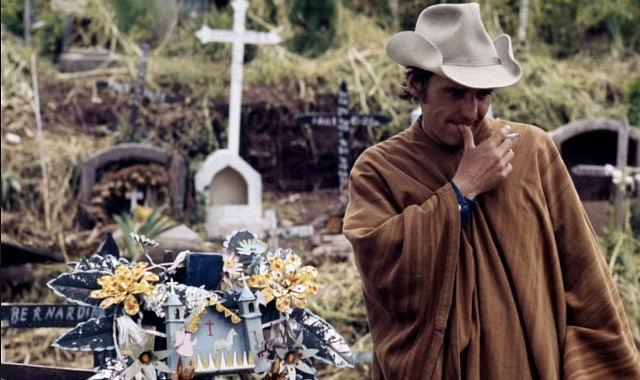This morning a friend wrote about my just-posted Last Movie review, to wit: “I especially enjoyed your analysis of what’s so wrong with the natives-as-primitive-idiot-filmmakers part. In the ‘70s, at campus film societies, that was always treated as the basic premise of the movie — the noble natives turning the tables on Hollywood. All very p.c. to the extent that it makes sense, which is barely.
“The one thing I was a little surprised at, now that you’ve seen it, is that you didn’t circle back to address the Bilge Ebiri/Eric Kohn masterpiece claims. I’d love to see you riff on what THAT’S all about…”

Dennis Hopper in The Last Movie.
HE response: “Eric and Bilge, brilliant as they basically are, are often generous to a fault. The ‘reassessment of a once derided or under-appreciated film’ template was set by Robin Wood‘s Hitchcock reassessments (particularly his explanation of the thematic undercurrents in North by Northwest) and then F.X. Feeney when he wrote his big forgiving reappraisal of Heaven’s Gate. Since that point guys with F.X.’s temperament — generous, obliging, film-wormy, mildly compassionate, butter wouldn’t melt in their mouths — occasionally scout around with an idea of becoming the next F.X. in terms of the next re-discovery.”
Critic friend: “I hold a much less charitable view of this whole aggressive-reassessment-of-indulgent-‘70s-messes-as-works-of-genius phenomenon than you do. I think there’s an intensely jejune left-wing narcissism to it — these works that were ‘too pure’ for the system, now ‘rescued’ by fearless-knight critics who are the only ones with a vision pure enough to see the truth (since I’m convinced that 90 percent of the people who seek these films out today, based on what writers like F.X. or Richard Brody or Bilge are saying, are STILL going to end thinking, ‘What the fuck was that about?’).
“And there’s such a perverse logic to it. Namely: Of COURSE these noble-soothsayer critics are the only ones who can ‘see the truth’ about these films. That’s because ‘the truth” of these films — i.e., that their epic flaws are actually topsy-turvy virtues — exists only in the critics’ self-glorifying heads.
HE response: “Somebody recently said, half-seriously, that maybe the next failed ’60s film to be reassessed might be Michelangelo Antonioni‘s Zabriskie Point. Honestly? It’s not such a bad film. It collapses when Mark Frechette and Daria Halprin make love in the Mojave desert with all those other couples on a sandy, dusty hillside, and I never felt that Rod Taylor‘s house exploding amounted to anything more than easy, facile nihilism. But it has some interesting portions. The way Antonioni doesn’t show Frechette actually shooting the uniformed L.A. cop but suggested he might have — the cutting of this moment is fascinating.
“Just Like That, Inspiration Can End,” posted on 12.30.16:
Journo pally: “I had never seen Michelangelo Antonioni‘s Zabriskie Point (’70) so I recently recorded it off TCM. Just finished watching it. Is this the worst film ever made by a major director? If not, what is?”
HE reply: “It has some interesting moments but yeah, it’s not a good film. It’s certainly Antonioni’s worst, and it definitely knee-capped his career. For the first time in his career he was riding high in the U.S. with Blow-Up in late ’66 and ’67, and then three years later, wham…dead meat.
“And I don’t mean that in commercial terms. Throughout the ’60s the Antonioni brand meant high-end art cinema of an exceptional caste. His films were onto something else. You could feel it, sense it. But Zabriskie Point blew that mystique out of the water. Then he got it back with The Passenger in ’75, at least in terms of that final shot.
“You know what Antonioni’s deal is. He wanted to keep things oblique. He concentrated on undercurrents by way of images, textures, quietness, empty spaces. He was never a purveyor of driving, fast-forward narratives. He was never been into overt emotion. Time and again he hinted at decaying, dissolute values and corrupt attitudes. In Zabriskie he tried to capture the chaos and nihilism of the late ’60s, but he didn’t want to be didactic or even somewhat specific about issues.
“The only line of dialogue I recall is Mark Frechette‘s at that activist meeting with Kathleen Cleaver — ‘Well, I’m ready to die. Of boredom.’ I also like how Antonioni doesn’t precisely indicate whether or not Frechette has shot the cop or not. I don’t what Rod Taylor was up to except that he was rich and wanted to fuck Daria Halprin.”
Journo pally: “Actually, Frechette tells Halprin he wanted to shoot the cop, but someone else did. I just watched it two hours ago so I remember this clearly.
“Antonioni might like oblique, but it sure doesn’t work here like it did in La Notte and other Euro flicks. It looks like he’s a clueless European slumming, with absolutely no knowledge of American culture, but totally willing to condescend to it. He hires two very beautiful non-actors, goes to the Mojave, films them fucking, then has a whole sequence of shit blowing up, like it’s some profound comment on the violence and commercialism of American culture. The film wasn’t received very well when it first came out, and it’s a total embarrassment now.”
